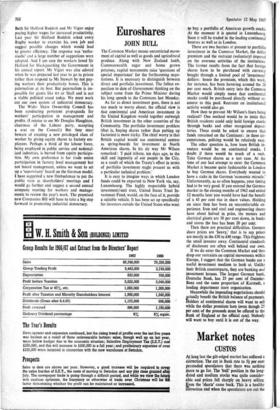Euroshares
JOHN BULL
The Common Market means unrestricted move- ment of capital as well as goods and agricultural produce. Along with New Zealand lamb, Commonwealth sugar and home grown potatoes, capital movements raise 'questions of special importance' for the forthcoming nego- tiations. It is necessary to distinguish between direct and portfolio investment. The fullest ex- position to date of Government thinking on the subject came from the Prime Minister during his long speech to the Commons last Monday.
As far as direct investment goes, there is not too much to worry about; the official view is that continental and American investment in the United Kingdom would together outweigh British investment in the other countries of the Community. The portfolio investment problem (that is, buying shares rather than putting up factories) is more tricky. The chief worry is that British capital would use continental centres as spring-boards for investment in North American shares. In his sly way Mr Wilson remarked : 'I paid tribute, ten days ago, to the skill and ingenuity of our people in the City, as a result of which the Treaty's effect in terms of portfolio investment might present us with a particular technical problem.'
It is easy to imagine ways in which London funds could be exported to New York via, say, Luxembourg. The highly respectable hybrid investment/unit trust, United States Trust In- vestment Fund, would, on the face of it, provide a suitable vehicle. It has been set up specifically for investors outside the United States who want
to buy a portfolio of American growth stocks. At the moment it is quoted in Luxembourg. Soon it will be traded in the leading continental bourses as well as in London.
There are two barriers at present to portfolio investment in the Common Market, the dollar premium and the restraint (voluntary) imposed on the overseas activities of the institutions. The former results from the fact that foreign shares have to be purchased with currency bought through a limited pool of 'investment' dollars: hence the premium, which this week, for instance, has been hovering around the 20 per cent mark. British entry into the Common Market would simply mean that continental stocks could be purchased directly without re- course to this pool. Restraint on institutional activity would also go.
How then to prevent Mr Wilson's fears being realised? One method would be to insist that British residents could only hold foreign stocks through banks and other recognised deposi- tories. These could be asked to ensure that funds remained on the Continent: in these cir- cumstances, policing would be relatively easy.
The other question is, how keen British in- vestors would be on continental stocks. I doubt if there would be much of a rush. Take German shares as a test case. At the time of our last attempt to enter the Common Market it became quite fashionable in London to buy German shares. Everybody wanted to have a stake in the German 'economic miracle.' Unfortunately, as so often happens, your timing had to be very good. If you entered the German market in the closing months of 1962 and exited 12 months later you would have had the benefit of a 45 per cent rise in share values. Holding on since then has been an uncomfortable ex- perience. Iron and steel and engineering shares have about halved in price, the motors and electrical giants are 30 per cent down, in banks and stores the loss has been 20 per cent.
Then there are practical difficulties. German share prices are 'heavy,' that is to say prices are mostly in the £30 to £40 range. This frightens the small investor away. Continental standards of disclosure are often well behind our own.
If we do enter the Common Market and thus drop our restraints on capital movements within Europe, I suggest that the German banks are a useful investment medium to look at. Unlilce their British counterparts, they are banking and investment houses. The largest German bank, Deutsche Bank, has 25 per cent of Daimler- Benz and the same proportion of Karstadt, a leading department store organisation.
Meanwhile the impending negotiations should Holders benefit the British balance of payments. Holders of continental shares will want to sell while the dollar premium lasts (even though 25 per cent of the proceeds must be offered to the Bank of England at the official rate). Nobody will want to buy until it is out of the way.






























 Previous page
Previous page